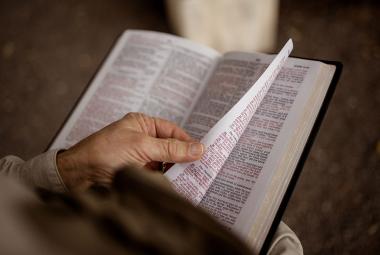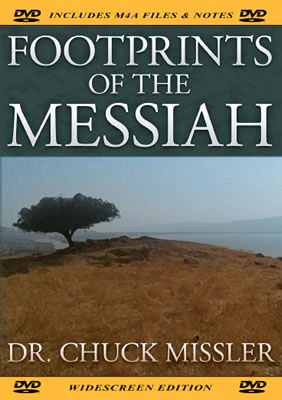We frequently quote St. Augustine’s observation, “In the Old Testament the New Testament is concealed; in the New Testament the Old Testament is revealed.”
Psalm 40:7 is speaking about the Lord when it says, “…in the volume of the book it is written of me” (Hebrews 10:5-10).
But the message of salvation isn’t necessarily clear at first skim through the Old Testament. As Hosea 12:10 says: “I have spoken by the prophets, and I have multiplied visions and used similitudes, by the ministry of the prophets.”
The word “messiah” is a derivative of the Hebrew Meshiach, which means “anointed,” specifically as a synonym for “king.” The important ritual of anointing future kings symbolized the Spirit and power of God on the man He had chosen to rule. David was anointed as king when he was still just a shepherd boy (1 Samuel 16:13), and David refused to harm God’s anointed King Saul (1 Samuel 26:9).
Throughout the Old Testament, the Messiah is depicted as Priest and King, Prince, Ruler, Redeemer, and Prophet—all positions of leadership. Space limitations prevent me from touching on the full abundance of verses depicting his leadership roles, so I will highlight a representative few here and encourage our readers to engage in further study on their own.
Messiah as the King
The sceptre shall not depart from Judah, nor a lawgiver from between his feet, until Shiloh come; and unto him shall the gathering of the people be.
Genesis 49:10
Judah had lost its national sovereignty during the 70-year captivity in Babylon, but even then the leaders had the authority to rule their fellow Israelites according to the Old Testament Law. It wasn’t until the Romans denied the Sanhedrin the right to use capital punishment that the scepter was considered to have departed from Judah. Josephus describes a situation in which the Sanhedrin illegally condemned a man to stoning without Roman authority.1 Augustin Lemann, in his 1886 book Jesus before the Sanhedrin, records a statement by Rabbi Rachmon on the matter:
When the members of the Sanhedrin found themselves deprived of their right over life and death, a general consternation took possession of them: they covered their heads with ashes, and their bodies with sackcloth, exclaiming: ‘Woe unto us for the scepter has departed from Judah and the Messiah has not come’2
So they thought. What they didn’t know was that He had indeed come and was living as a young boy in a carpenter’s shop in Nazareth.
Messiah as the Prophet
The LORD thy God will raise up unto thee a Prophet from the midst of thee, of thy brethren, like unto me; unto him ye shall hearken; According to all that thou desiredst of the LORD thy God in Horeb in the day of the assembly, saying, Let me not hear again the voice of the LORD my God, neither let me see this great fire any more, that I die not. And the LORD said unto me, They have well spoken that which they have spoken. I will raise them up a Prophet from among their brethren, like unto thee, and will put My words in his mouth; and he shall speak unto them all that I shall command him. And it shall come to pass, that whosoever will not hearken unto My words which he shall speak in my name, I will require it of him.
Deuteronomy 18:15-19
Messiah as David’s Lord
The LORD said unto my Lord, Sit thou at my right hand, until I make thine enemies thy footstool. The LORD shall send the rod of thy strength out of Zion: rule thou in the midst of thine enemies.
Psalm 110:1-2
Messiah as the Eternal Priest
The LORD hath sworn, and will not repent, Thou art a priest for ever after the order of Melchizedek.
Psalm 110:4
Messiah as Melchizedek Offering Bread and Wine and Receiving Tithes
And Melchizedek king of Salem brought forth bread and wine: and he was the priest of the most high God. And he blessed him, and said, Blessed be Abram of the most high God, possessor of heaven and earth: And blessed be the most high God, which hath delivered thine enemies into thy hand. And he gave him tithes of all.
Genesis 14:18-20
Messiah as Counselor, Father, God, Prince of Peace and Kingly Heir of David
For unto us a child is born, unto us a son is given: and the government shall be upon his shoulder: and his name shall be called Wonderful, Counsellor, The mighty God, The everlasting Father, The Prince of Peace. Of the increase of his government and peace there shall be no end, upon the throne of David, and upon his kingdom, to order it, and to establish it with judgment and with justice from henceforth even for ever. The zeal of the LORD of hosts will perform this.
Isaiah 9:6-7
The prophetic books are full of allusions to Jesus the Messiah as a Leader:
- Isaiah 11:1-5: The Just Judge
- Isaiah 42:1-5: The Servant Ruler
- Jeremiah 23:5: The Righteous Judge
- Jeremiah 23:6: The LORD our Righteousness
The Son of David
In Ruth, chapters 1-4, we see Jesus in Boaz’s role as our Kinsman Redeemer. Psalm 18:43 tells us that foreigners (like us) will serve Him. In Isaiah 8:13-14, he is described as a Sanctuary, and in Isaiah 59:20 he is called the Redeemer. It is difficult to pick just a few verses showing the multitude of positions Jesus the Messiah would fill.
Isaiah 11:5 describes him as the Stem of Jesse (the father of King David). In Zechariah 3:8 and again in 6:12, he’s the Branch. The Old Testament consistently refers to the Messiah as a descendant of David and the rightful heir to David’s throne (1 Kings 2:45, Isaiah 9:7, Psalm 132:11, Jeremiah 33:15-17). We also see this interesting allusion to the keys of the House of David in Isaiah 22:21-25.
Micah 5:2 tells us that he “whose goings forth have been from of old, from everlasting” will be born in Bethlehem, the City of David (1 Samuel 17:15, 20:6).
Finally, we offer one last Scriptural example that identifies Jesus as the Messiah as presented in the Old Testament:
The Triumphal Entry
The Triumphal Entry involves one of the most astonishing passages in the Bible. Matthew 21, Mark 11, Luke 19 and John 12 all describe the monumental day Jesus presented Himself, riding into Jerusalem on the donkey’s colt in fulfillment of Zechariah 9:
Rejoice greatly, O daughter of Zion; shout, O daughter of Jerusalem: behold, thy King cometh unto thee: He is just, and having salvation; lowly, and riding upon an ass, and upon a colt the foal of an ass.
Zechariah 9:9
Jesus purposely fulfilled this prophecy, telling His disciples to bring Him a donkey from the nearby village of Bethphage as they traveled from Bethany to Jerusalem four days before the Passover. Jesus rode the donkey down the Mount of Olives with multitudes shouting “Hosanna!” and laying down their clothes in front of Him (Matthew 21:7-9), and He did so on the very day prophesied by the angel Gabriel in Daniel 9:24-25.3 He entered through the eastern gate, called the Beautiful Gate in ancient times, and that week He celebrated a last Passover meal with His disciples before His crucifixion. Ezekiel gives us a remarkable prophecy regarding that particular gate:
Then he brought me back the way of the gate of the outward sanctuary which looketh toward the east; and it was shut. Then said the LORD unto me; This gate shall be shut, it shall not be opened, and no man shall enter in by it; because the LORD, the God of Israel, hath entered in by it, therefore it shall be shut. It is for the prince; the prince, he shall sit in it to eat bread before the LORD; he shall enter by the way of the porch of that gate, and shall go out by the way of the same.
Ezekiel 44:1-3
The eastern gate is the oldest of the gates in the current wall of Jerusalem, now called the Golden Gate, or the Gate of Mercy. It looks out on the Mount of Olives and the Kidron Valley, and in pictures of that gate today, it’s easy to see it’s been blocked up; in 1541, the Ottoman Sultan Suleiman the Magnificent had the Golden Gate sealed. According to Jewish tradition, he did this to prevent the Messiah from entering the city through the gate as prophesied. If that was his true reason, he was too late. The LORD had already come and gone.
The Once And Future King
In Luke 4:18-19 Jesus stands up in the synagogue and reads aloud from Isaiah 61, literally introducing Himself as the Messiah:
The Spirit of the Lord GOD is upon me; because the LORD hath anointed me to preach good tidings unto the meek; he hath sent me to bind up the brokenhearted, to proclaim liberty to the captives, and the opening of the prison to them that are bound; To proclaim the acceptable year of the LORD…
Isaiah 61:1-2a
He stops there and closes the book. He does not complete the sentence. The passage in Isaiah continues from there, saying:
…[A]nd the day of vengeance of our God; to comfort all that mourn; To appoint unto them that mourn in Zion, to give unto them beauty for ashes, the oil of joy for mourning, the garment of praise for the spirit of heaviness; that they might be called trees of righteousness, the planting of the Lord, that He might be glorified.
Isaiah 61:2b-3
Jesus reads, “To proclaim the acceptable year of the LORD,” but refrains from reading, “and the day of vengeance of our God…”
In Jesus’ first appearance on the earth, He announced Himself as the Messiah who came to set the captives free in the acceptable year. These words of the Lord would have been recognized by the Jews as a reference to the Jubilee, the year when prisoners were released and debts were cancelled. In the synagogue that day, Jesus intentionally chose not to remind them of the coming day of vengeance.
The Jews did not understand the two-part nature of the Messiah’s job on earth. They were expecting Jesus to ride in and free them from the Romans, to take His throne and rule the earth from Jerusalem right then. Even the disciples were carried away by their expectations, not listening to Jesus’ warnings that He would suffer and die, that He had come to lay down His life for His sheep (John 10:15-18, Matthew 12:40). John and James earned the irritation of their fellows when their mother asked Jesus if they could sit on Jesus’ right hand and left hand in His Kingdom (Matthew 20:21-24). They didn’t yet appreciate that Jesus’ first visit would be as the Suffering Servant who came to die according to Isaiah 53, and that He would not come to claim His throne for thousands of years.
Jesus gently rebuked two of His followers on the road to Emmaus on Resurrection morning, because His purpose was there in the Old Testament all along. Both Isaiah and Daniel give hints of this two-fold calling, of both His death and His future glory:
Therefore will I divide him a portion with the great, and he shall divide the spoil with the strong; because he hath poured out his soul unto death: and he was numbered with the transgressors; and he bare the sin of many, and made intercession for the transgressors.
Isaiah 53:12
I saw in the night visions, and, behold, one like the Son of man came with the clouds of heaven, and came to the Ancient of days, and they brought him near before him. And there was given him dominion, and glory, and a kingdom, that all people, nations, and languages, should serve him: his dominion is an everlasting dominion, which shall not pass away, and his kingdom that which shall not be destroyed.
Daniel 7:13-14
And yet…
And after threescore and two weeks shall Messiah be cut off, but not for himself: and the people of the prince that shall come shall destroy the city and the sanctuary; and the end thereof shall be with a flood, and unto the end of the war desolations are determined.
Daniel 9:26
The Messiah’s being “cut off” has to predate His everlasting dominion. The Bible makes clear that Jesus is the King, that He will rule on David’s throne and Christ’s Second Coming will be “to execute judgment upon all, and to convince all that are ungodly among them of all their ungodly deeds…” (Jude 1:15). The Messiah will also return to comfort those who mourn and to clothe His people with garments of praise.
In his First Coming, though, when He came to lay down His life for His sheep, He chose to stop at the comma—a comma that has lasted more than 2000 years.
The Lord has not forgotten. Not one jot nor tittle shall pass from the Law, not the crossing of a “t” nor dotting of an “i” shall be omitted, until all is fulfilled (Matthew 5:18). The Word of God will be completed perfectly to the letter, but God is not willing that any should perish, but that all should come to repentance (2 Peter 3:7-9).
Are we like the First Century Jews, reading in the Word of God only what we want to see? We need to be careful when reading the Scriptures to read deeply with an awareness that God uses every detail to give His message to a fallen race. One of the most important lessons to take away from this reading is that we pay attention to the fullness of the entire Word of God.
This was an excerpt from Chuck Missler’s book Footprints of the Messiah. https://store.khouse.org







